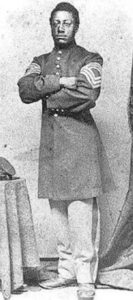
Lewis Douglass
9*Lewis Henry Douglass was born on this date in 1840. He was a Black typesetter, soldier, teacher, and administrator.
He was born in New Bedford, Massachusetts, and was the oldest son of Frederick Douglass and his first wife, Anna Murray Douglass. He was well educated and, as a boy, apprenticed in Rochester, New York, as a typesetter for his father's newspapers, The North Star and Douglass' Weekly.
He joined the Union Army on March 25, 1863. He fought with the 54th Massachusetts Infantry Regiment. Shortly after joining the army, Douglass attained the rank of Sergeant Major, the highest rank a Black man could reach. He participated in the Battle of Grimball's Landing (the second James Island battle), the Second Battle of Fort Wagner, and the Battle of Olustee. At the Second Battle of Fort Wagner, half of his regiment was killed, but this battle turned the public's attention toward the sacrifices made by Blacks in the war. Douglass was also wounded in the Second Battle of Fort Wagner and became ill, forcing him to be medically discharged from the army in 1864.
After the American Civil War, he worked as a teacher for the Freedman's Bureau. In 1866, Lewis and his brother, Frederick Douglass, Jr., went to Denver, where they were hosted by Henry O. Wagoner, a friend of their father. Wagoner taught the brothers typography, along with William J. Hardin; Lewis taught reading, writing, and other subjects to adult blacks in Wagoner's home. Douglass married Helen Amelia Loguen in 1869 and moved to Washington, D.C., where he became the first typesetter employed by the Government Printing Office. Douglass's employment by the Government Printing Office as a typesetter did not last long because he could not join the typesetters' union as a Black man.
Like his father, he was a "valuable citizen" to Washington, D.C., through his involvement with the New National Era and other political impacts. He helped establish and was the senior editor of the New National Era (1870-1874) with his father, a "well-conducted" newspaper aimed at addressing the issues of the Black community in D.C. He had a political impact when appointed to the legislative council of the District of Columbia by Ulysses S. Grant, where he pushed for racial equality by creating a bill that required restaurants to post their prices so they could not overcharge Blacks. During the period of U.S. expansion, Douglass was an outspoken critic of the McKinley administration for its involvement in the Philippines and its lack of commitment to solving domestic issues of racial violence toward Blacks.
He said: “It is a sorry, though true, fact that whatever this government controls, injustice to dark races prevails. The people of Cuba, Porto Rico [sic], Hawaii, and Manila know it well as do the wronged Indian and the outraged black man in the United States.” Lewis Douglass had a stroke in 1904 that greatly impacted his health, and he died four years later, on September 19, 1908, at the age of 67.